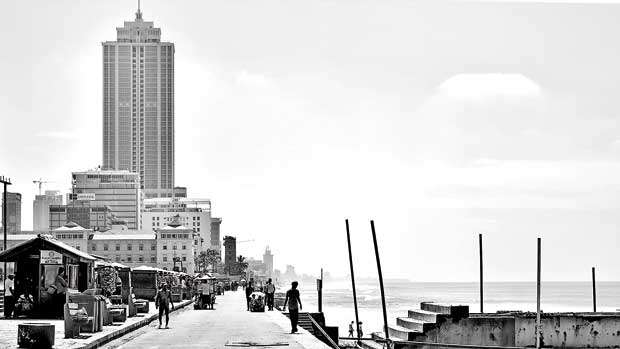Reply To:
Name - Reply Comment
Last Updated : 2024-04-25 20:04:00

A friend of mine, who suggested on Facebook that democracy touting Colombo 7 liberals have been calling Maithripala Sirisena a gamarala and a gramasevaka, got the following reply from an irate Colombo citizen: “Those insults came from the SLFP when he contested.” This same friend, when he suggested that “Colombo 7 wants democracy but not elections”, got an even pithier response: “Aren’t they Sri Lankan citizens too?” To which the friend retorted: “Supposedly.” 
Both sides have a point. Colombo, specifically Colombo 7, hasn’t exactly been quiet about its preferred political outcomes when it comes to its rhetoric about democracy and good governance. On the other hand, Pamankada is as much a part of this country as Alimankada and for this reason, dishing the blame for the country’s problems to a specific suburb is as self-defeating as claiming that what this country needs is a leader from Cinnamon Gardens and Colpetty.
When Malinda Seneviratne once suggested that residents of these places would be perfectly happy to secede from the rest of the country and install the Queen as their head of state, he was indulging in caricature. Many of those who bash Colombo today, however, are not indulging in that sort of caricature. They are indulging in invective. The anger of these bashers, in that sense, is more complicated.
At one level it’s a reaction against the simplifications many of those from Colombo tout. It is true that Sirisena was branded as a gamarala and godaya and gramasevaka negatively by the SLFP (before he won the 2015 election), but as commentators like Seneviratne have observed, long before Sirisena thought of defecting, those same Colombo democracy-loving good governance-fetishising citizens minced no words in their insults against Mahinda Rajapaksa over the latter’s rural roots.
Sure, it’s hard to say whether those insults were motivated by a sustained antipathy from their end towards the non English speaking majority, but it’s not hard to say that they were provoked in part at least by anger at seeing an “outsider” calling the shots in their part of the world. That the UNP, the preferred party, scrounged up the highest number of votes (101,920) and seats (24) FROM THE WHOLE COUNTRY at the 2011 Local Government election in Colombo, DESPITE the Urban Development Authority’s unparalleled beautification drive (spearheaded by Gotabaya Rajapaksa), confirmed just where this milieu’s loyalties were. They also confirmed what Rosy Senanayake once remarked during her campaign as the UNP’s candidate for Mayor of the City: that Colombo was the heart of the Party. “Is Buttala its buttocks then?” Malinda asked. Tongue-in-cheek, of course.
 Given these facts, equating Colombo with everything anti-Rajapaksa and anti-Sirisena and equating everything anti-Rajapaksa and anti-Sirisena with everything anti-rural and anti-outstation is not the sign of political reductionism some cut it out to be. On the other hand, that this means a vast majority of Colombo residents are opposed to those outstation areas is a hasty conclusion to jump to. If at all, it betrays the critics’ inability to see beyond simplistic binaries, since in their discourse, Colombo is “bad” and outside-Colombo is “good.” (If there’s a single statistic proving this dichotomy beyond a shadow of a doubt, I am yet to come across it.)
Given these facts, equating Colombo with everything anti-Rajapaksa and anti-Sirisena and equating everything anti-Rajapaksa and anti-Sirisena with everything anti-rural and anti-outstation is not the sign of political reductionism some cut it out to be. On the other hand, that this means a vast majority of Colombo residents are opposed to those outstation areas is a hasty conclusion to jump to. If at all, it betrays the critics’ inability to see beyond simplistic binaries, since in their discourse, Colombo is “bad” and outside-Colombo is “good.” (If there’s a single statistic proving this dichotomy beyond a shadow of a doubt, I am yet to come across it.)
Let’s get some perspective here. What is Colombo? It is a city spanning an area of 37 square kilometres extending from the four storey households of Cinnamon Gardens to the two roomed apartments of Pamankada. It begins just after Kohuwela, Nugegoda, and Dehiwela in the south and ends in Mattakkuliya up north. It houses those who attend Colombo International and reside in Ward Place as well as those who attend Royal College and reside in the shanties of Thimbirigasyaya.
The national majority (Sinhalese and Buddhist) make up less than 50 percent of the population, while the figures for Tamils, Muslims, and other minorities exceed their corresponding national percentages. Like most capital cities, it drains people from the rest of the country, provoking a massive rural-urban exodus. The population density, the highest in Sri Lanka (more than 50,000 per square mile), which this exodus serves to compound, makes strange bedfellows out of racial diversity and social disparity: an engineer can expect an opening monthly salary of Rs. 45,000 living in an annexe with a monthly rent of Rs. 15,000, while the driver of the Uber you just hailed sleeps in his cab parked next to a kiosk every night. It is home to both opulence and poverty, both amity and bigotry. In short, it is a world inhabited, and shared, by two cultures.
"Colombo, specifically Colombo 7, hasn’t exactly been quiet about its preferred political outcomes when it comes to its rhetoric about democracy and good governance"
Colombo is the biggest city in the country. Can we jump to conclusions about its inhabitants the way we can (and do) regarding the inhabitants of other cities, villages, districts, and provinces? Can we say, for instance, that the people of Colombo lack patriotism and that this shows in their voting preferences? I hardly think so. Yes, it is home to Colombo-is-our-heart-wielding rhetoric politicos like Senanayake, but it also was home to S. L. Gunasekara and Lakshman Kadirgamar. Did they lack nationalist credentials? No. Did their actions validate those credentials? Yes. How can we say, then, that patriotism is the preserve of the outstations?
The brutal truth is that it is easy to spit invective at privilege. Easy to confuse privilege for contempt. Easy to howl against it while writing about it within the confines of a leisured existence. That is not, however, how radicalism is bred. That is how armchair radicalism is bred: you rant against institutions of privilege while being perched atop those very same institutions. I should know the hypocrisy behind this. I dabbled in it once myself.
When Gustavo Arellano argued, in an article written to the L. A. Times days after the Woolsey fire began devouring parts of Los Angeles this month, that it was “futile to spend millions saving homes” in Malibu (one of the richest suburbs in the area) since it was created “not for love of the great outdoors or frontier rusticity, but rather as thickets of privacy against L.A.’s working classes”, he enraged a great many readers, one of whom, in a reply, indicted the article as “horribly insensitive.”
Driven by anger, this reader added, “When a tragedy strikes, can’t he just see the grief and the humanity?” For him, what made matters worse was Arellano referring to a seminal critique of suburban privilege by Mike Davis (City of Quartz) titled “The Case for Letting Malibu Burn”, in which he describes Malibu and other wealthy cities as “white flight havens” that have barricaded the bourgeoisie against social minorities. Davis’s argument, deeply compelling to me, incorporates Marxist analysis and social theory. It is a sound thesis, in other words, not a series of hysterical outbursts against the “elitism” of the city dweller.
"Colombo bashers are fond of claiming that Western models do not work out in non settler colonial countries like Sri Lanka. They are fond of criticising the IMF and the World Bank for bullying us into accepting Western metrics"
What makes it reductionist to apply such an argument to Colombo is that in Sri Lanka, for the most, the urban-rural “white flight” exodus was never as rampant as it was and is in other parts of the world, the DEVELOPING world included. Colombo, then, is not the barricade against social minorities these armchair bashers paint it out to be, nor is it the exclusive or near-exclusive preserve of those who wish to create, and sustain, a rift between themselves and the outstations.
Yes, there are those who look down on the social other. Yes, there are those who have profited from the “kolambata kiri gamata kekiri” dichotomy that years of privatisation, deregulation, and mass public sector pilferage have facilitated. But then there must be a sense of proportion. Colombo is not Malibu. Nor is it Los Angeles. Nor will it ever be a Malibu or a Los Angeles, even with a dictatorial rule under the UNP. And why? Because for every insular “Kolombian”, there will be a great many active citizens who care for, and love, this country, regardless of petty political preferences.
Colombo bashers are fond of claiming that Western models do not work out in non settler colonial countries like Sri Lanka. They are fond of criticising the IMF and the World Bank for bullying us into accepting Western metrics. At the same time, they don’t see any problem in resorting to Western scholars, Marxist or otherwise, in their critiques of urbanisation and urban privilege. They are anti-Western when it comes to capitalism and pro-Western when it comes to diatribes against capitalism. Depending on how you see it, this is a sign of intellectual bankruptcy or hypocrisy. The end result is the same: we have not produced an original thinker, an original radical, who is on par with, but is also not an imitation of, a Mike Davis.
That friend I mentioned at the beginning, by the way, posted a comment on Arellano’s article: “... if Colombo had been wiped out by the tsunami, the entire country would have developed overnight.” Mike Davis wanted a fire. Our radicals want a tsunami. Between the one and the other, I can’t spot out much of a difference. Can you?

Add comment
Comments will be edited (grammar, spelling and slang) and authorized at the discretion of Daily Mirror online. The website also has the right not to publish selected comments.
Reply To:
Name - Reply Comment
US authorities are currently reviewing the manifest of every cargo aboard MV
On March 26, a couple arriving from Thailand was arrested with 88 live animal
According to villagers from Naula-Moragolla out of 105 families 80 can afford
Is the situation in Sri Lanka so grim that locals harbour hope that they coul